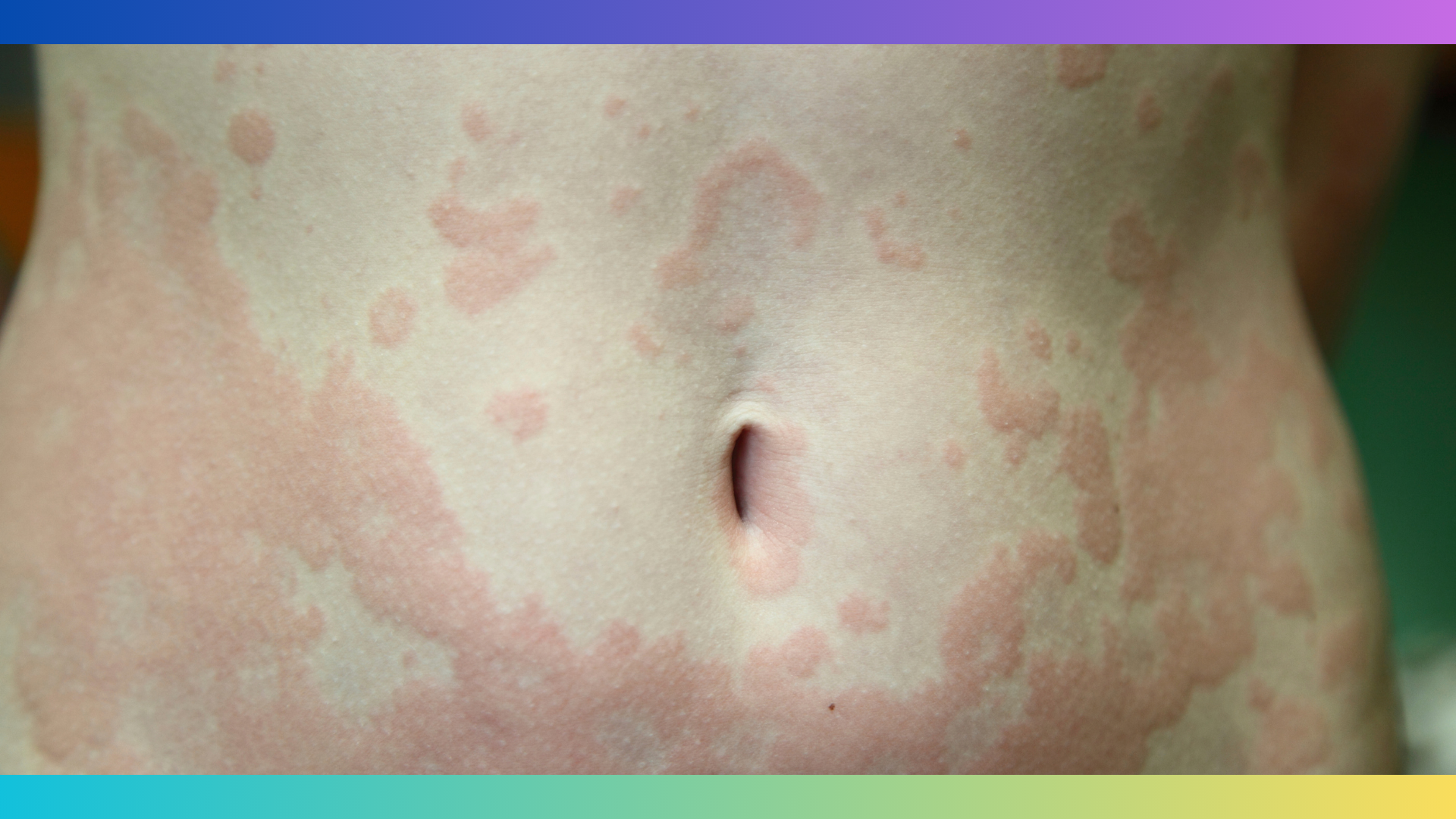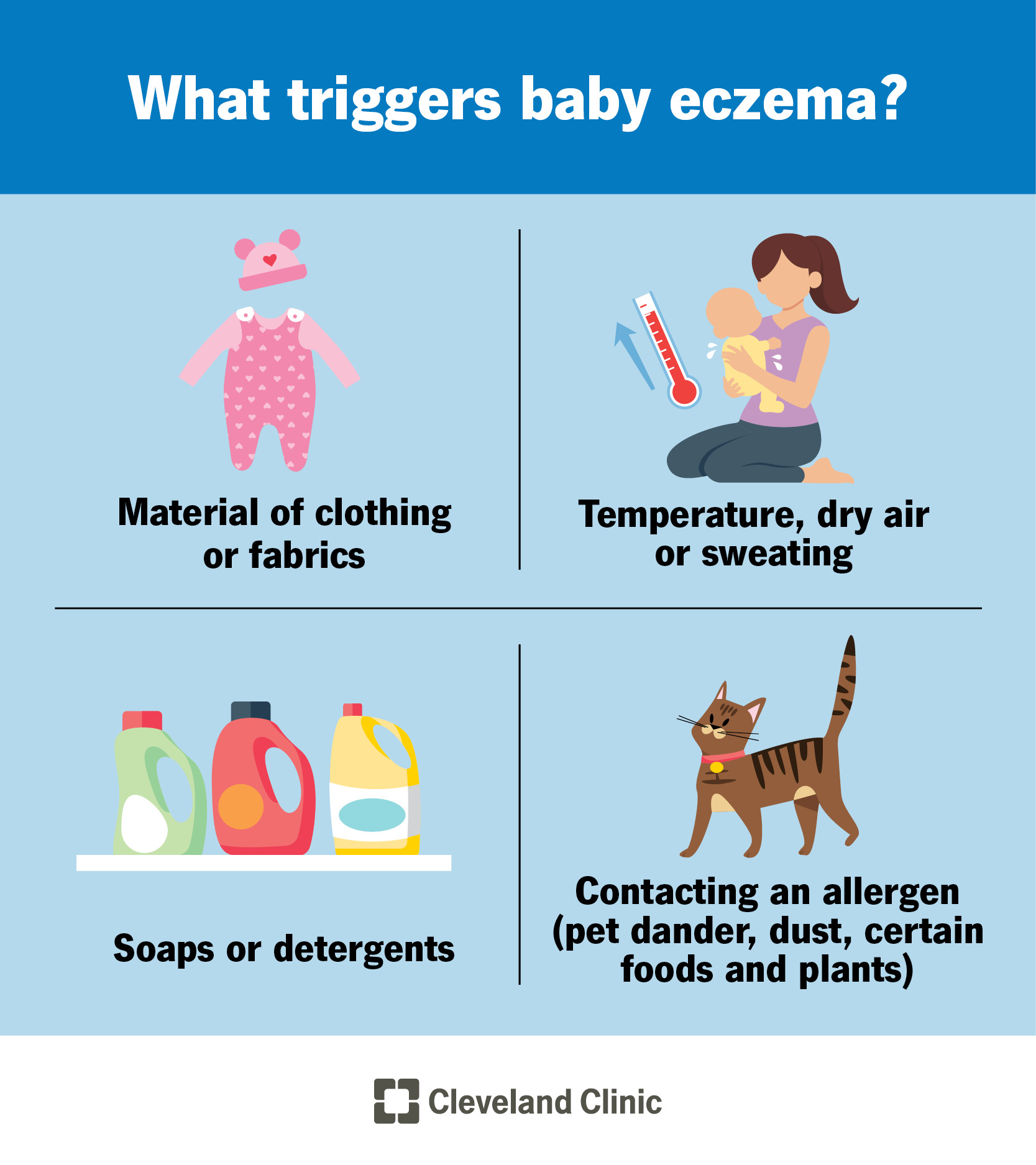Physical Address
304 North Cardinal St.
Dorchester Center, MA 02124

Atopic eczema is a common skin condition in infants causing itchy, inflamed rashes. In the first few months of life, infants may experience red, dry, and scaly patches on their skin, often affecting the face, scalp, and body.
These patches may appear in cycles, worsen with irritants, and lead to scratching, which can result in infection. While the exact cause of atopic eczema is unknown, it is believed to involve a combination of genetic and environmental factors. Early diagnosis and proper management, including gentle skin care, moisturizers, and avoiding triggers, can help alleviate symptoms and improve the baby’s quality of life.
Seeking medical advice is essential for an accurate diagnosis and personalized treatment plan for infants with atopic eczema.

Credit: nationaleczema.org
Atopic eczema, also known as atopic dermatitis, is a common skin condition that affects many infants. This chronic inflammatory disorder is characterized by dry, itchy, and inflamed skin. It is important for parents to have a good understanding of atopic eczema in infants to effectively manage their child’s symptoms and provide them with relief. Below, we will delve into what atopic eczema is, its prevalence in infants, and tips for managing this condition.
Atopic eczema is a non-contagious skin condition that commonly affects infants. It is a form of dermatitis that usually begins in infancy and can persist into childhood and adulthood. The exact cause of atopic eczema is unknown, but it is believed to be due to a combination of genetic and environmental factors.
Infants with atopic eczema often exhibit symptoms such as dry and scaly skin, intense itching, red and inflamed patches, and oozing or crusting of the skin. These symptoms can cause discomfort and affect the quality of life for both the infant and their parents. While there is no cure for atopic eczema, there are various treatment options available to manage the symptoms and provide relief.
Atopic eczema is a common condition that affects a significant number of infants worldwide. According to research, approximately 15-20% of infants experience atopic eczema at some point in their early years. It is more prevalent in developed countries, with lifestyle and environmental factors playing a role in its occurrence.
Research suggests that certain factors may increase the risk of an infant developing atopic eczema. These include a family history of atopic diseases, such as eczema, asthma, or hay fever, having a weak skin barrier, exposure to irritants or allergens, and living in a dry or cold climate.
It is important for parents and caregivers to be aware of the prevalence of atopic eczema in infants, as early detection and appropriate management can help improve the child’s quality of life and reduce the severity of symptoms.
Managing atopic eczema in infants requires a comprehensive approach that involves both medical treatments and daily skincare practices. Some essential tips for managing atopic eczema in infants include:
By following these tips and working closely with healthcare professionals, parents can effectively manage their infant’s atopic eczema and improve their overall quality of life. It is essential to remember that each child may respond differently to various treatments, so patience and ongoing communication with healthcare providers are key.
Understanding the causes of atopic eczema in infants is crucial for parents and caregivers in managing and preventing this common skin condition. While there is no exact known cause, research suggests that a combination of genetic factors and environmental triggers contribute to the development of atopic eczema in infants. Let’s take a closer look at these factors:
One of the primary factors that contribute to atopic eczema in infants is genetics. If one or both parents have a history of eczema, asthma, or allergies, the likelihood of their child developing atopic eczema increases significantly. Certain genes are responsible for the impaired skin barrier function and heightened immune response that characterize atopic eczema. While genetics play a role, it is important to note that not all infants with a family history of atopic eczema will necessarily develop the condition.
In addition to genetic factors, environmental triggers can also play a significant role in triggering atopic eczema in infants. These triggers can vary from one child to another, but some common culprits include:
Identifying and avoiding these environmental triggers, as much as possible, can help manage and prevent atopic eczema in infants. However, it’s important to note that triggers may vary from one child to another, and what works for one may not work for another.
By understanding the genetic factors and environmental triggers that contribute to atopic eczema in infants, parents and caregivers can take proactive steps to minimize flare-ups and provide the best possible care for their child’s delicate skin.
Atopic eczema, also known as atopic dermatitis, is a common skin condition that often begins in infancy. It is important for parents to be aware of the symptoms of atopic eczema in infants, as early identification and treatment can help manage the condition and provide relief to the baby. This article will focus on two key symptoms of atopic eczema in infants – skin rash and redness, as well as itching and irritation. Understanding these symptoms can assist parents in promptly seeking medical advice and implementing appropriate skincare measures for their little ones.
A prominent symptom of atopic eczema in infants is the presence of a skin rash and redness. The rash typically appears on the cheeks and scalp, but it can also affect other areas of the body such as the arms, legs, and trunk. The rash often appears as dry patches of irritated skin that may be rough, scaly, or even oozing in more severe cases. It is crucial to note that the rash and redness in infants with atopic eczema may come and go, flaring up during periods of heightened sensitivity or in response to triggers such as certain foods, environmental factors, or irritants in creams or soaps. Parents should consult a healthcare professional for a proper diagnosis if their baby presents with persistent or concerning skin rash and redness.
Infants with atopic eczema may experience itching and irritation, which can be distressing for both the baby and the parents. The itching sensation can lead to excessive scratching, which, in turn, can worsen the condition or even cause skin infections. It is important for parents to monitor their baby for signs of itching, such as constant rubbing of the affected areas or fussiness during sleep due to discomfort. Itching can disrupt sleep and affect the baby’s overall well-being. Taking measures to soothe and alleviate itching, such as maintaining proper skincare and using gentle, hypoallergenic moisturizers, can play a crucial role in managing atopic eczema in infants.
To summarize, identifying the symptoms of atopic eczema in infants is essential for early intervention and management of the condition. Skin rash and redness, as well as itching and irritation, are two common symptoms to watch for. If your baby displays these symptoms, it is advisable to seek medical guidance to ensure accurate diagnosis and appropriate treatment. By understanding and addressing these symptoms, parents can help improve their baby’s comfort and quality of life.
:max_bytes(150000):strip_icc()/hlt-ezcema-creams-test-pipette-baby-julia-warren-03-7314e13e674448d2a26ac24c8b1b9d53.jpeg)
Credit: www.health.com
Atopic eczema, also known as atopic dermatitis, is a common skin condition that affects infants. It is characterized by red, itchy, and inflamed skin. Managing atopic eczema in infants is crucial to minimize discomfort and prevent further flare-ups. By establishing a comprehensive skin care routine and avoiding triggers, you can help alleviate your baby’s symptoms and promote healthy skin.
A well-designed skin care routine is essential in managing atopic eczema in infants. Keeping your baby’s skin moisturized is key to reducing dryness and itchiness. Here are some steps you can follow:
When selecting a moisturizer, opt for one that is free from irritants such as fragrances, dyes, and preservatives. Look for natural ingredients like shea butter or ceramides, which help restore the skin’s barrier function. Regularly moisturizing your baby’s skin will help prevent dryness and reduce the risk of eczema flare-ups.
Avoiding triggers is another crucial aspect of managing atopic eczema in infants. Identifying and eliminating potential irritants can significantly reduce flare-ups. Some common triggers include:
| Irritants | Solutions |
|---|---|
| Fragrances and perfumes | Avoid scented products including soaps, lotions, and laundry detergents. |
| Allergens (dust mites, pet dander) | Regularly clean and vacuum your baby’s environment. Keep them away from pets if they are a known allergen. |
| Harsh fabrics (wool, polyester) | Dress your baby in soft, breathable fabrics like cotton. Avoid tight clothing that can cause irritation. |
| Temperature changes and excessive sweating | Dress your baby based on the weather and avoid overheating. Keep them in a cool, well-ventilated environment. |
| Stress and emotional triggers | Create a calm and soothing environment for your baby. Engage in activities that promote relaxation and happiness. |
By identifying and avoiding these triggers, you can help reduce the frequency and severity of your baby’s eczema symptoms.
Treatment options for atopic eczema in infants include gentle skin care, avoiding triggers, and using moisturizers and corticosteroid creams as prescribed by a healthcare professional. It is important to seek medical advice to ensure proper management of this condition in babies.
Atopic eczema, also known as infantile eczema, is a common skin condition that affects many babies. While there is no cure for this condition, there are several treatment options available to help manage and alleviate the symptoms. It is important to consult with a healthcare professional to determine the best course of action for your infant. Here are two main treatment options commonly used for atopic eczema in infants:
Topical medications are often prescribed by healthcare professionals to treat atopic eczema in infants. These medications are applied directly to the affected areas of the skin and can help reduce inflammation and itching. There are several types of topical medications available, including:
It is important to follow the instructions provided by your healthcare professional when using topical medications for your infant’s eczema.
In addition to topical medications, natural remedies can also be used to manage atopic eczema in infants. These remedies aim to soothe and moisturize the skin, and may help reduce inflammation and itching. Some commonly used natural remedies include:
While natural remedies can be safe and effective, it is important to seek guidance from a healthcare professional before using them on your infant. They can provide personalized advice and ensure that these remedies do not interact with any other medications.
Managing and treating atopic eczema in infants requires a comprehensive approach that combines the use of topical medications and natural remedies. With proper care and guidance from healthcare professionals, it is possible to alleviate the symptoms of atopic eczema and improve your infant’s quality of life.

Credit: my.clevelandclinic.org
To treat atopic eczema in babies, use a gentle fragrance-free cleanser, apply moisturizer regularly, avoid hot baths, opt for cotton clothing, and keep your nails short to prevent scratching. Consult a pediatrician for a proper diagnosis and treatment plan.
Atopic eczema in babies is caused by a combination of genetic and environmental factors. These factors can include a family history of eczema, an overactive immune system, and exposure to irritants like soaps or fabrics. It is important to keep the baby’s skin moisturized and avoid triggers to manage the condition.
The number one cause of eczema in babies is genetics or a family history of eczema.
To treat a child with atopic eczema, you can: 1. Moisturize their skin daily using a gentle lotion or cream. 2. Avoid triggers like harsh soaps, fragrances, and rough fabrics. 3. Use corticosteroid creams to reduce inflammation during flare-ups. 4.
Keep their nails short and encourage frequent hand washing. 5. Consult a pediatrician or dermatologist for personalized treatment options.
Early detection and proper management of atopic eczema in infants is crucial in providing relief and improving their quality of life. By following a consistent skincare routine, identifying triggers, and seeking medical advice when necessary, parents can greatly alleviate the discomfort and symptoms associated with this condition.
With proper care and attention, infants can grow up free from the burden of atopic eczema and lead happy, healthy lives.

